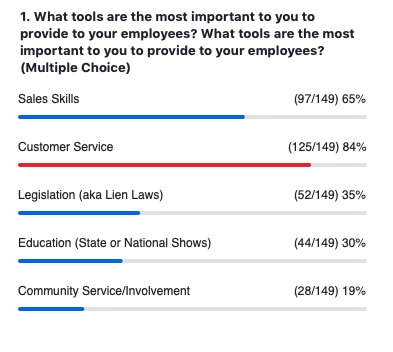Menu
Sign in below to keep watching.
So, you have a tenant who can't or won't pay. What now? In this Session, we get expert insight on how to stop units from expiring, how to handle auctions when they do, and how to navigate your state's lien laws.
Featured Speakers: Alonna Ross and Brian Wofford
Moderators: Melissa Huff & Tommy Nguyen
Category: Operations
Focus: Owners and Managers
Aired: May 27, 2021
Duration: 1:16:16
If you don't have time to watch the whole Session, here are some of our favorite parts:
We asked our experts: What’s the biggest lesson you’ve learned when navigating these personal situations around payment, delinquency, and auctions?
"You have to stay consistent. You've got to 'train' your tenants. You've got to stay consistent and hold to your schedule. Hold to your process. Have a plan in place. Your entire team, from beginning to end, have to have their S.O.P.s in place. They should know what to do from beginning to end." - Alonna Ross
"Be clear and transperent about expectations. When they should pay, how they should pay, the way they should pay. If you're clear with everything upfront, and you're very honest right off the bat, that you have expectations and they have expectations. Make sure everything is laid out on the table. Things just go a lot better. And, don't forget to be nice to people." - Brian Wofford
"Don't take it personally. You usually get to know tenants and it's really easy to take it personally when someone stops paying or starts giving you a hassle. There are so many personal things about it. But you have a business to run at the end of the day, you have to collect money to pay your bills and your employees. Do the human things, show compassion, but don't take it personal. It's still a business." - Melissa Huff
Self Storage Association, Legal Resources.
Handling payments, lien laws, and auctions is tricky and personal. It'll never be easy, but with a clear process, straightforward communication, and diligent follow-through, you can make it easier and safer for your team and your customers. It's important to be human, and it's important to have a plan. You can be both compassionate and firm. At the end of the day, you have to run your business and follow the lien laws of your state, but knowing what they are and setting clear expectations can make navigating this part of the industry as straightforward, safe, and consistent as possible.
Gabfocus Sessions are virtual workshops for self storage owners, managers, and operators. Brought to you by the team behind Gabfest: StoragePug and Affordable Storage Guys Management.
Each session features hand-picked industry pros who will dive deep into relevant topics surrounding our industry, share best practices, and explore trends in the market. It's our hope that these sessions help you navigate your self storage business better during these uncertain times.
Want to learn more about self storage? Join us on select Thursdays for Gabfocus.



Our panelists will be happy to answer any questions you have. We hope you enjoyed this Gabfest Session. Talk soon!
“Once your operation is in place, you can become more dynamic with your pricing, but that requires data. You need some method of being able to record the data that you need to know whether your price is in the right place - whether you need to move it up or start giving some concessions.” - Warren Lieberman
“I never want to downplay to what someone else is doing. I'm better than they are, then I'm going to be worth a higher price. That's what value is. If you go out to a restaurant and get really good service, would you go back? Yes! What if it was pricier? You'd still go back because you got better service and a better product.” - Jim Mooney
"It's good to be informed on your competition. I don't want to ignore them, but I don't want to respond too strongly to them either." - Warren Lieberman
"We did a survey of 10,000 facilities on their pricing. We found out that two-thirds of those operators didn't change the price of a single unit of the course of a month." - Warren Lieberman
“Rate increases and value pricing are the number one ways to grow your revenue.” - Jim Mooney
"Tenants in more convenient units tend to be less price sensitive." - Warren Lieberman
"The size of the unit is only one aspect of what people are willing to pay for." - Warren Lieberman
Lease up marketing strategies:
Your average customer value
Find the average stay length of all tenants. Next take your economic occupancy and divide by how many units you have. That will tell you what the average customer pays.
Multiply the average length of stay by what the average customer pays, and that's the average value of a customer.
For example, if a customer stays for 12 months and pays $100 per month, then their value is $1,200.
Your average lead value
Figure out your closing rate (or conversion rate) i.e. how many leads do you turn into tenants? Multiply that by your average customer lifetime value to figure out what your leads are worth.
Pro Tip: see which lead sources are converting the best. It may be that certain sources have a higher conversion rate, so those leads are worth more to you than a source that barely converts.
Typical Lease-up timeline
According to our panelists, it's typical to see a 3-4% increase each month, putting your facility at 36% after the first year, and 72% after the second.
Alternately, you can look at your lease up goals through the lens of your units, aiming for 20 units rented per month.
For Nick and StorageMax, they pro forma their economic occupancy at 85% with their sweet spot at 92%.